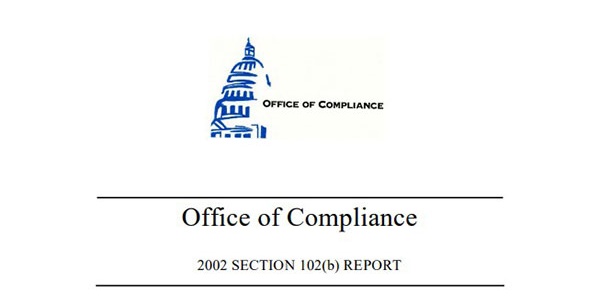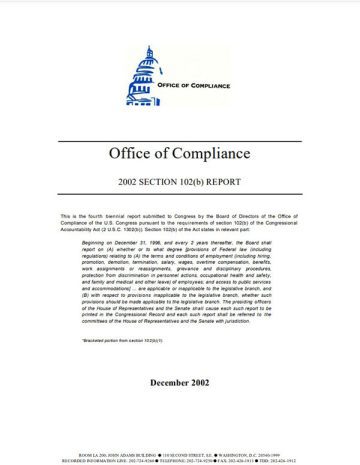Introduction
During the more than half-century prior to the enactment of the Congressional Accountability Act of 1995(CAA), Congress enacted major regulatory schemes covering many aspects of workplace health and safety, civil rights, and the employment relationship, while at the same time consistently excluding itself and other instrumentalities of the Legislative Branch from these laws. The nearly unanimous approval of the CAA in the opening days of the 104th Congress reflected a renewed national consensus that Congress must again live under the laws it enacts for the rest of society and return to the constitutional principles declared so eloquently by James Madison.
A fundamental aspect of the CAA is that it is not meant to be static. The Act intended that there be an ongoing, vigilant review of federal law to ensure that Congress continues to apply to itself – where appropriate – the labor, employment, health, and safety laws it passes. The Office of Compliance was tasked with the responsibility to review federal law each Congress and to make recommendations on how the CAA should be expanded. Unfortunately, despite this well intended process of review, no further action has been taken by Congress since the passage of the CAA in 1995 to ensure that it is not still “making legal discrimination in favor of themselves[.]” (James Madison, The Federalist, No. 57)
Since its creation by the CAA, the Board of the Office of Compliance has duly submitted biennial Reports to Congress in 1996, 1998, and 2000 (as well as an Interim Report in 2001 regarding section 508 of the Rehabilitation Act of 1973), detailing the limited and prudent amendments that should be made to the CAA. With the exception of a request by Committee on House Administration Chairman Robert Ney for clarification of the recommendations made in the 2000 Report and the Interim Report of 2001, no progress has been made on these recommendations. Neither the House nor the Senate has held any hearings, and no legislative action has been taken on any of the recommendations.
Now that Congress has had substantial time to reflect on the contents of these reports, it is critical that it continue the example set in 1995 with the enactment of the original provisions of the CAA. Without action on these recommendations, the noble goal of the Congressional Accountability Act may gradually be eroded.

